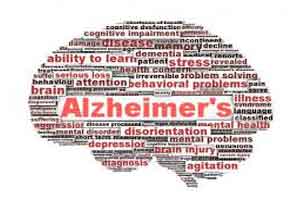- Home
- Editorial
- News
- Practice Guidelines
- Anesthesiology Guidelines
- Cancer Guidelines
- Cardiac Sciences Guidelines
- Critical Care Guidelines
- Dentistry Guidelines
- Dermatology Guidelines
- Diabetes and Endo Guidelines
- Diagnostics Guidelines
- ENT Guidelines
- Featured Practice Guidelines
- Gastroenterology Guidelines
- Geriatrics Guidelines
- Medicine Guidelines
- Nephrology Guidelines
- Neurosciences Guidelines
- Obs and Gynae Guidelines
- Ophthalmology Guidelines
- Orthopaedics Guidelines
- Paediatrics Guidelines
- Psychiatry Guidelines
- Pulmonology Guidelines
- Radiology Guidelines
- Surgery Guidelines
- Urology Guidelines
Protein Amyloid responsible for development of Alzheimers

University of Bergen researchers have found a protein that could hold the key to understanding how Alzheimer's disease develops.
Alzheimer's disease is caused by protein (amyloid) deposition in the brain. New research at the University of Bergen (UiB) and Haukeland University Hospital shows that the protein PITRM1, which is found in mitochondria, otherwise known as the powerhouses of the cell, may be involved in the development of the disease.
"When the level of PITRM1 in the cells decreases, this leads to an increase in the deposition of protein sediment in the brain," says researcher Janniche Torsvik, at the Mitochondrial Medicine & Neurogenetics (MMN) research group at UiB's Department of Clinical Medicine (K1).
The results were published recently in the journal EMBO Molecular Medicine.
From gene defect to brain sediment
The group has investigated a family with a gene defect that leads to reduced amounts of PITRM1. The family suffered major physical and psychological problems.
"The family had reduced amounts of this PITRM1 protein and became increasingly ill. Scans of their brains confirmed the damage and when we tested mice with the same loss of PITRM1, these too had neurological problems and protein deposition in the brain," says Torsvik.
Torsvik points out that the new study is important to understand neurodegenerative diseases such as Alzheimer's disease.
"The results conclude a long discussion about the relationship between mitochondria and accumulation of amyloid in the brain. We have found that mitochondria play a crucial role in the process of protein deposition," says Torsvik.
Searching for new medication
Professor Laurence A Bindoff, who is leading the MMN group in Bergen, wants to do more research on PITRM1 and its role in other neurodegenerative diseases.
"Our aim is that this research will help us find medications to prevent or delay diseases like Alzheimer's," says Bindoff.
He wants to find out more about diseases such as Alzheimer's and has applied to become a Norwegian Centre of Excellence (SFF), a programme administered by the Research Council of Norway.
To read further click on the link given below:
- D. Brunetti, J. Torsvik, C. Dallabona, P. Teixeira, P. Sztromwasser, E. Fernandez-Vizarra, R. Cerutti, A. Reyes, C. Preziuso, G. D'Amati, E. Baruffini, P. Goffrini, C. Viscomi, I. Ferrero, H. Boman, W. Telstad, S. Johansson, E. Glaser, P. M. Knappskog, M. Zeviani, L. A. Bindoff.Defective PITRM1 mitochondrial peptidase is associated with A amyloidotic neurodegeneration. EMBO Molecular Medicine, 2015; 8 (3): 176 DOI: 10.15252/emmm.201505894

Disclaimer: This site is primarily intended for healthcare professionals. Any content/information on this website does not replace the advice of medical and/or health professionals and should not be construed as medical/diagnostic advice/endorsement or prescription. Use of this site is subject to our terms of use, privacy policy, advertisement policy. © 2020 Minerva Medical Treatment Pvt Ltd